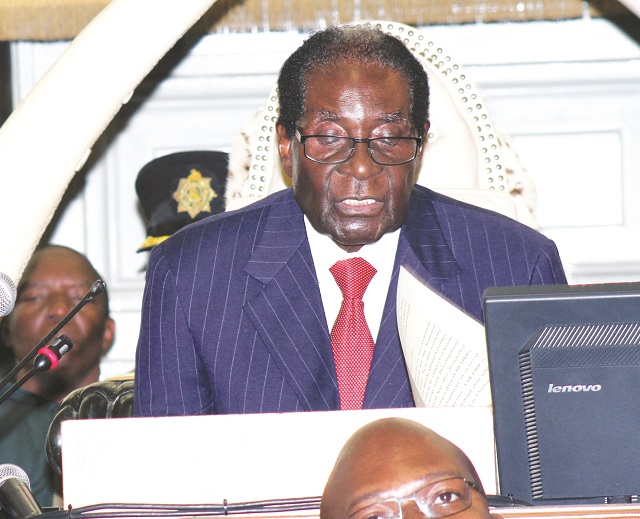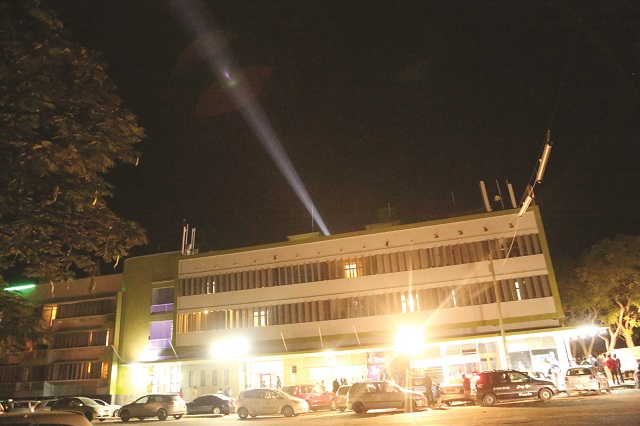President lauds S.I 64

Oliver Kazunga, Senior Business Reporter
PRESIDENT Mugabe yesterday hailed Statutory Instrument 64 that was promulgated in June saying it has started making a positive impact on the economy.
SI 64/2016, which removes several goods from the Open General Import Licence is meant to protect local industry where it has capacity to meet demand.
In his State of the Nation Address to Parliament, President Mugabe said the positive impact of SI64/2016 has so far been noted through the efficient use of foreign currency and enhanced local production in the manufacturing sector.
“SI64/2016 has already started to bear fruit by improving the efficient use of foreign exchange and in enhancing local production, thereby reducing import dependency. A number of local companies in the plastic packaging and food manufacturing sector that include Tregers, Nampack, Proplastic and several others have been the immediate beneficiaries of Statutory Instrument 64 of 2016,” said the President.
He said the national economy could also be rejuvenated through policy reforms.
“Acceleration of the implementation of policy reforms if supported by the Government policy action in revitalising agriculture, infrastructure development, unlocking the potential of small to medium enterprises, encouraging private sector investment, fostering financial sector stability and through the observance of zero tolerance to corruption, the reforms are meant to both rejuvenate the national economy and contribute to poverty reduction,” President Mugabe added.
He said in light of the current drought being experienced in the country, the Government was importing maize in order to address the grain deficit.
“To date, Government has imported over 300 000 tonnes of maize while about 200 000 tonnes have been delivered to the Grain Marketing Board depots by our farmers.
“Meanwhile, the private sector has also supported Government by importing 25 000 tonnes. And to this, the amount of $360 million of grain importation pledged by our development partners, I wish to appreciate and thank the private sector and development partners who have joined hands with Government to ensure that our people get sufficient food surplus,” he said.
He said the Government has introduced command agriculture targeting a minimum of two million tonnes of maize from farmers with irrigable and dry land farms among A1 and A2 and small-holder farmers.
The President added that the Government was also rolling out the Presidential Input Support Scheme to support 800 000 communal farmers with the aim to revitalise agricultural productivity to ensure national food security.
Beyond tobacco production, which has immensely recovered in the last few years, he said the Government would support the production of other crops such as soya beans, wheat and cotton.
“Government is working on the resuscitation of cotton production in the forthcoming two seasons by providing inputs to cotton farmers. It is also part of the cotton resuscitation programme to restructure the Cotton Company of Zimbabwe,” he said.
President Mugabe said Zimbabwe’s dairy industry was poised for further growth as Government together with private players were jointly implementing comprehensive inclusive national milk production programmes.
“In 2015, milk production reached only 58 million litres against an estimated national demand of 120 million litres,” he said.
Turning to the mining sector, the President said this year the mining sector in general performed favourably, buoyed by favourable market prices especially of precious metals.
He said cumulative declared mineral export shipments to June 2016 totalled $981.4 million contributing 63,4 percent of national export proceeds with the major earners being gold, platinum, diamonds, ferrochrome and nickel.
President Mugabe said the recent promulgation of the Special Economic Zones Act should provide greater impetus in facilitating foreign direct investment, employment creation, and increased export receipts among other fundamentals.
He also noted that tourism continues to experience tremendous growth and development registering a total of 902 435 tourist arrivals during the first half of the year.
“The average national room occupancy rate has marginally increased from 41 percent to only 42 percent and by year end it is forecast that Zimbabwe will record 2,5 million tourist arrivals.











Comments